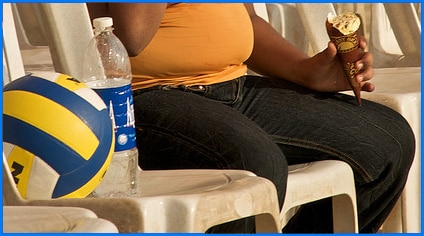
We looked yesterday at the difficulties faced by the editors of the forthcoming Diagnostic and Statistical Manual, DSM-5, as explained by Gary Greenberg, who also talks about the currently favored method of considering an array of symptoms. Until a more “scientific” way can be found, the hope is to move away from either/or definitions of mental illnesses to more of a checklist approach, which provides a descriptive diagnosis according to a kind of point system. The goal, Greenberg says, is…
[…] to augment the current binary approach to diagnosis, in which you either have the requisite symptoms or you don’t, with a method for quantifying gradations in illness.
This notion of “quantifying gradations in illness” rings a bell, and for good reason. Dr. Pretlow, who sees food addiction in children as totally real, also sees it as occupying a spectrum. Compelling evidence points to a serious dependence on highly pleasurable foods as a significant component of the childhood obesity epidemic, and the struggle to lose weight is proportional to BMI percentile. Dr. Pretlow says,
Addiction to the pleasure of food appears to be on a ‘continuum’ — overweight kids would seem to be partially addicted; obese kids are fully addicted; morbidly obese kids are likely in tolerance mode.
The DSM criteria describing substance addiction are very interesting because they are so often satisfied by the histories of obese children. The relationship between kids, teens, and hedonic or highly pleasurable or hyperpalatable foods sounds just like addiction.
And what is it that leads so many kids down the food addiction path? The elements of the Childhood Obesity Perfect Storm, including the overabundant food environment, and other external factors. However, the much touted ignorance of kids and parents about healthy eating has almost no importance. People, including most kids, know by now what they’re supposed to eat. Their problem is that they can’t stop eating the wrong stuff, and the main reason for that is the prevalence of comfort eating as an emotional “fix,” which can lead to an addiction to highly pleasurable foods.
The indictment of comfort eating is based on 134,000 messages from children and teenagers addressed to the Weigh2Rock website, where a very large number of those messages talk about comfort eating.
Top 6 Reasons Why Food Addiction Falls Within the Already-Established Criteria for Addiction as Set Forth in the Current Edition, DSM-IV:
In Overweight: What Kids Say, Dr. Pretlow talks about six criteria for addiction, as defined by the DSM-IV and the World Health Organization. If the patient is experiencing three out of six, a doctor feels confident in diagnosing an addiction:
* Using a large amount of the substance over a long period of time: True of food addicts.
* Unsuccessful efforts to cut down: True of food addicts, just like other addicts, because their brain chemistry is messed up.
Dr. Pretlow says,
This clinical data is corroborated by neuroimaging PET data, which reveals that low dopamine D2 receptor levels in the striatum of the brain are strikingly similar in obese and drug addicted individuals. Further, a recent study in rats showed that highly pleasurable foods such as bacon, cheesecake, and cake frosting may induce cocaine-like addiction with similar brain changes.
* Time spent in obtaining the substance replaces social, occupational, or recreational activities: True of food addicts.
* Use of the substance continues despite adverse and even disastrous consequences: True of food addicts. If they were lab rats, they would endure electric shocks to get a fix.
* The need for ever-increasing amounts of the substance. Dr. Pretlow says of the Weigh2Rock kids,
Many say that their eating is ‘out of control.’ Actual tolerance may develop… they eat larger amounts and higher pleasure-level foods to obtain the same degree of comfort.
* Abstaining from the substance causes withdrawal symptoms: True of food addicts. One feature of Overweight: What Kids Say is a plan to kick problem foods one at a time.
Another similarity between food addicts and those hooked on hard drugs or alcohol is that very often the patient perceives, consciously or unconsciously, that something is wrong in his or her psyche, and seeks out a medicine that will correct the imbalance. Of course, the substance is usually a trickster. It helps the emotional pain only temporarily or not at all, and usually makes the situation even worse.
And, last but not least, what food addiction and other addictions have in common is the thing that is not just a river in Egypt: denial.
Your responses and feedback are welcome!
Source: “Inside the Battle to Define Mental Illness,” Wired, 12/27/10
Image by colros (Colin Rose), used under its Creative Commons license.

 FAQs and Media Requests:
FAQs and Media Requests: 












One Response